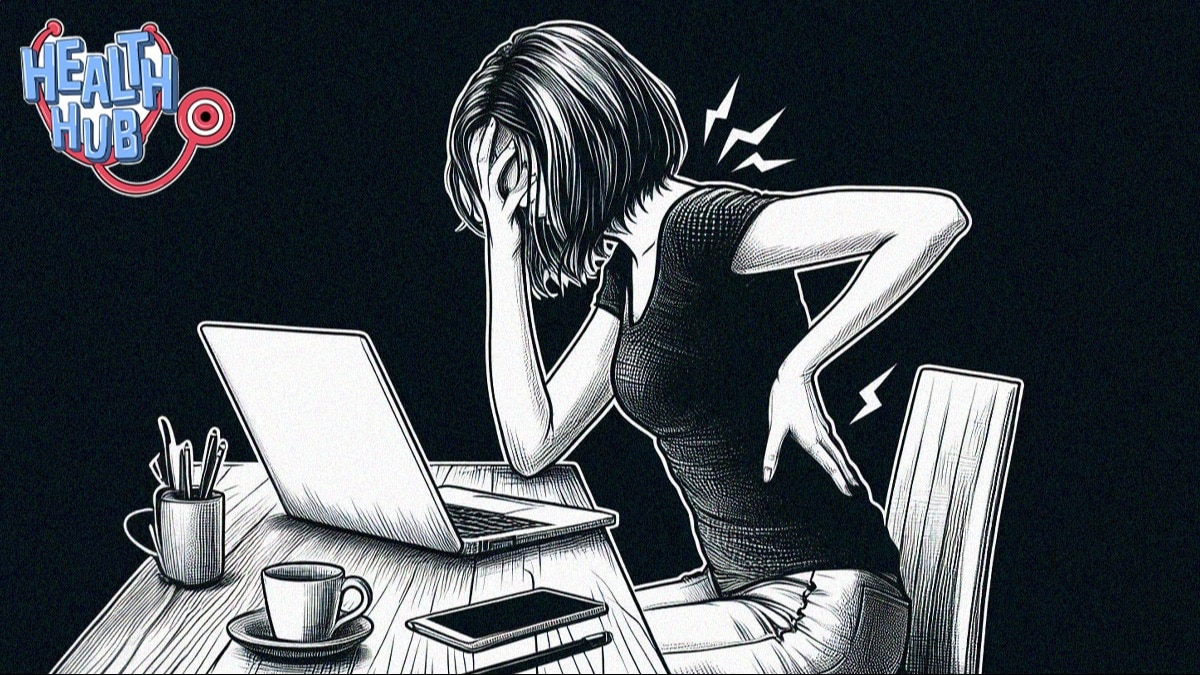
GET UP, TAKE A WALK: HOW SITTING AFFECTS YOUR WORKPLACE WELL-BEING
In the digital age, laptops have become our constant companions, blurring the lines between work and leisure. With the world stuck in the eight-hour shift in corporate life and then consuming the addictive world of OTTs, a silent danger looms.
The perils of an inactive lifestyle, exacerbated by the daily grind of a desk job, are stealthily encroaching upon our well-being. Complaints of back issues, neck problems, and shoulder aches are rising by the day. Though they seem temporary, they leave a lasting impression on us.
From a hunched back to eye strain, disrupted sleep patterns, and even the epidemic of obesity, the consequences of extended periods spent sitting on a chair can manifest as a cascade of health issues.
Who would've known that a 5-minute walk after every 30 minutes of sitting could have long-term benefits?
THE SITTING DISEASE
"Sitting too much kills", reads the opening line of a 2016 study on how modernity is associated with obesity, more than 30 chronic metabolic diseases, and high healthcare costs.
Excessive sitting, also called "sitting disease", is when a person remains in a seated position for eight to ten hours a day without any movement.
Researchers from Mayo Clinic analysed 13 studies of sitting time and activity levels. They found that those who sat for more than eight hours a day with no physical activity had a risk of dying similar to that posed by obesity and smoking.
SHORT-TERM AND LONG-TERM EFFECTS OF SITTING
Experts have said that people who sit a lot, especially those with desk jobs have long-term musculoskeletal health effects.
"In the short term, individuals may experience discomfort, stiffness, and fatigue. Over the long term, conditions like musculoskeletal imbalances, lower back pain, and increased risk of chronic diseases can occur," Dr Debashish Chanda, Lead Consultant, Department of Orthopedics, CK Birla Hospital, Gurugram, told IndiaToday.In.
When you sit, catecholamines, one of the hormones that increase because of stress, cause hypertension.
"We have been seeing a higher trend of early hypertension in the younger population related to desk jobs and sitting in front of laptops," Dr Sameer Anand, Senior Consultant, Orthopaedics and Joint Replacement, Max Smart Super Speciality Hospital, Saket told IndiaToday.In.
Dr Anand highlighted the short-term effects of getting tennis elbow, debilitating shoulder pain, high blood pressure, lower metabolism rate, and lack of concentration resulting in lower work productivity.
Dr Vivek Dahiya, Director, Institute of Musculoskeletal Disorders and Orthopaedics, Medanta, Gurugram, said that muscle stiffness can lead to reduced blood circulation in the body causing fatigue, weight gain, herniated discs and an increased risk of various heart issues.
Studies have shown that sitting in front of a laptop can increase pain in the legs when you suddenly get up to walk as it tightens the hip flexors and hamstrings.
HOW DOES SITTING LEAD TO DIABETES?
One of the long-term effects of "sitting disease" apart from heart attacks and stroke is the development of type 2 diabetes, a major lifestyle disorder affecting more than 100 million people in India.
Researchers have found that when you sit for a long time, the position relaxes the large muscles in the body. According to Harvard Medical School, when muscles relax, they take up very little glucose from the blood, raising your risk of type 2 diabetes.
The only solution: Get up and start doing muscle-flexing activities.
THE PSYCHOLOGICAL EFFECT
Psychologist Apurva Singh Verma, Head of Products & Service Excellence at Elephant In The Room (EITHR) told IndiaToday.in that prolonged periods of sitting can have implications on mental health, particularly in professional settings.
"It decreases productivity, diminishes cognitive function, and heightens stress levels. The mere absence of taking breaks can result in low motivation. Encouraging employees to take frequent breaks and engage in physical activity can easily enhance mental and emotional resilience," said Apurva Singh Verma.
Tune InEFFECTIVE TIPS TO COME OUT OF THE 'SITTING DISEASE'
"Take a walk, go have a glass of water. Come back, and do some exercises for the shoulders, neck, and lower back before you sit back on the chair again and continue your work. There has to be a time for investment in the body. This time requires you to do exercises of the neck, shoulders, elbows & wrist, and eyes," said Dr Sameer Anand.
Dr Amitabh Parti, Director & Unit Head Internal Medicine, Fortis Memorial Research Institute, Gurugram, listed simple solutions that you should follow to keep yourself active when you have a desk job.
Regular Breaks and Movement: Take short breaks every hour to stretch and move around. Incorporate exercises like neck rotations and shoulder stretches.
Ergonomic Workspace: Set up an ergonomic workstation with an adjustable chair and monitor to promote a healthy posture.
Hydration and Nutrition: Stay hydrated and maintain a balanced diet to support overall health and energy levels.
Exercise Routine: Walking, jogging, or gym workouts, counteract the sedentary nature of a desk job.
Eye Care: Follow the 20-20-20 rule to reduce eye strain - look at something 20 feet away for 20 seconds every 20 minutes.
Stress Management: Practice stress-reducing activities like meditation or deep breathing to manage stress associated with desk work.
Regular Health Check-ups: Schedule regular health check-ups to monitor and address any emerging health issues.
Give yourself five minutes every day, get up, and take a short walk. It will help you sit longer the next time.
ALSO READ | Faridabad hospital conducts north India's first-ever successful hand transplant 2024-01-22T05:34:55Z dg43tfdfdgfd